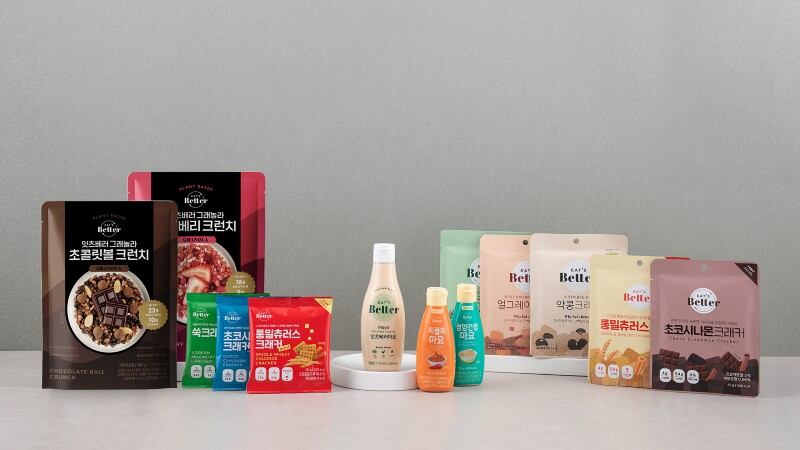The PlantEat has taken a very different approach to most other plant-based firms by opting not to focus its first products on the more common meat and dairy alternatives, but instead on the sauce and bakery sector.
Its first product was a plant-based mayonnaise, and it now has 34 SKUs including a variety of crackers, cookies and granola, as well as Home Meal Replacement (HMR) frozen meal kits in addition to doing B2B work on ingredients such as beef flavourings.
“South Korean food culture is actually very dependent on meat and other animal protein, so here the draw towards plant-based is actually not so much veganism as it is weight loss,” The PlantEat Data Scientist Lee Iksung told FoodNavigator-Asia.
“Many consumers who are looking towards adopting a plant-based diet in South Korea are mainly doing so for weight loss purposes, so being able to lose weight on this diet is really a big draw.
“This is based on the idea that the consumption of plant-based fats supposedly makes it easier to lose weight as compared to animal fats – this is not a confirmed [scientific] fact, but many people believe it and there are many [anecdotes] about this, driving the demand for more plant-based products.”
Lee added that millennials are the firm’s main target consumer demographic based on these observations, as this is the group which is in the circle where weight loss is viewed with the most priority.
“It is common knowledge that plastic surgery is a big thing in South Korea, and actually weight loss is also like a second culture here as well,” he said.
“We initially started marketing our products based on a plant-based and healthy message, but this garnered low attention and it was only when we shifted the message to weight loss and fitness that we got a big reaction from consumers.
“That said, our plan is really to start from this point and get people to know the brand based on this message first, then make the shift towards a sustainability messaging as the main goal – it is also another reason why we are targeting millennials as this group is more environmental conscious.”
The technology
The PlantEat’s development process is based on what it has deemed the Plant Alternative Materials System (PAMS), a database comprising 20,000 to 30,000 pieces of compound data.
“What we do is we pick a product, say milk, and dissect it into all its components e.g. lactose, sugars, proteins and so on, and then look at other plant-based compounds to find the best match to replace the original animal-based one,” said Lee.
“PAMS has a ranking system, and interestingly when we ran milk through it, beer came out as the number one result so milk and beer appear to be ‘cousins’ per se – and indeed, we do use beer enzymes in some plant-based milk products and have found this to really help.
“PAMS provides us with the base and from there we tweak the functionalities and taste in our lab and do computer simulations to test the amount of component to add and so on. In the end, it is still up to a food scientist to get the recipe exactly right, but PAMS helps us to speed up the process to get to the starting point much faster than reading study papers to find component replacements.”
The PlantEat’s products are currently available in major Korean department stores such as Shinsaegae and Hyundai, premium food outlets, IKEA Korea and online e-commerce platforms.
Local focus
The PlantEat is already exporting some products to Hong Kong via Green Monday, as well as to Singapore via online platforms, but Lee told us that at present the focus will remain on South Korea as a priority for the firm.
“We need to really concentrate locally got now as there are many large companies launching their own plant-based brands as they have realized there is money to be made here, so we have to really focus to stay ahead of them,” he said.
“We do have a lot of patents on hand so we should be okay, and in fact there are various companies coming to us looking for a faster way to create plant-based products too, so it’s too early to say if the current climate is bad or good, though the market traction does look like it could be a good thing.”
When it does come to expansion though, the firm’s preference will be to license out as opposed to exporting products, both to save on costs and reduce their environmental footprint.
“All R&D will be done in Korea including formulating the perfect recipes for whatever country we expand into based on available commodities and tastes, but we believe in local sourcing and manufacturing as it is more environmentally-friendly,” said Lee.
“Licensing as opposed to exporting products from Korea will also help in selling the products at more affordable prices to locals as there will be no added costs from import taxes and things like that.”
NPD and innovation
The PlantEat will also soon be hopping on the plant-based meat wagon, as it is participating in the XPrize Feed The Next Billion competition which challenges teams to produce chicken breast or fish fillet alternatives for a prize of up to US$7mn.
The firm is currently the only South Korean team in the competition and is working on perfecting its plant-based chicken. It also has plans to create a beef mincemeat, both of which will eventually be sold for retail individually as well as used in its RTE meals.
“We’re also working on a plant-based milk using a mix of ingredients, and are trying to improve our bakery line by looking for cream and butter alternatives,” said Lee.
“The main aim in plant-based innovation in Korea is for the eating experience to be enjoyable and happy, as opposed to previous plant-based products that were always only based on soy or chemically-flavoured – everyone is moving away from that and we are too.”




